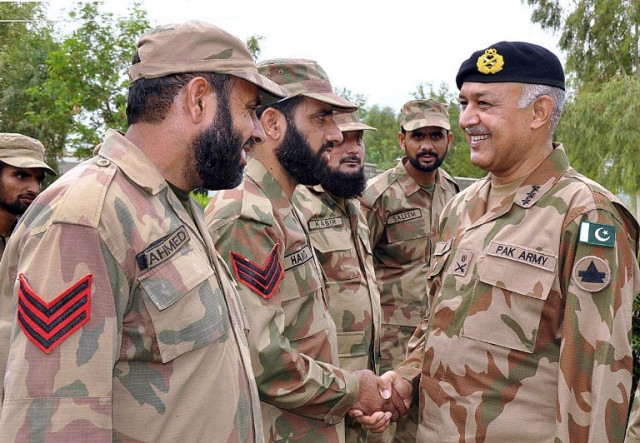Fight against militancy: Top Army commander praises ‘private’ militias
Lt-Gen Asif Yasin Malik calls for strengthening Aman lashkars.

A senior commander of the Pakistan Army has said that private militias – paradoxically called Amn Lashkars – have played a commendable role in maintaining peace and normalcy in some parts of the restive tribal regions.
In a brief address to tribal elders and volunteers of an Amn lashkar in Frontier Region Kohat, Peshawar Corps Commander Lt-Gen Asif Yasin Malik also said that extremists have been flushed out from several areas as a result of military operations and the writ of the state has been re-established there.
According to the BBC Urdu, Lt-Gen Malik appreciated the contribution of tribal militias in fighting the Taliban militants – but at the same time he called for further strengthening these lashkars. He called upon the militiamen to stand united against the Frankenstein of militancy.
Lt-Gen Malik claimed that extremist groups have been weakened as a result of successive military operations, and called upon the tribal elders to not allow the extremists to regroup in their villages and towns.
Chief of the Jowakai Aman Lashkar, speaking on the occasion, said that dozens of volunteers from his militia have been killed and their houses destroyed by militants. “Notwithstanding these losses, our morale is high and we will continue to fight the extremists,” Naib Khan added.
However, Khan demanded that his lashkar be provided with weapons and funds to keep this fight against a well-equipped enemy going.
Lt-Gen Malik assured him of help and said that nobody could deny the praiseworthy sacrifices of Aman lashkars in the tribal areas.
Jowakai is a semi-tribal area, around 25 kilometres northeast of Kohat city and it borders another semi-tribal area of Darra Adam Khel. Recently, Taliban insurgents blew up hundreds of houses belonging to pro-government tribal elders and volunteers of Aman lashkar.
Encouraged by the “successes of the policy of raising lashkars”, the government is replicating this policy elsewhere, especially in the regions along the border with northeastern Afghanistan where fugitive militants carry out attacks from across the border.
“About 100 personnel of police, levies and paramilitary forces have been martyred in militants’ attacks from across the border during the last 3 to 4 months,” said military spokesperson Maj-Gen Athar Abbas in an interview to Radio Pakistan.
However, he added that Army and paramilitary Frontier Corps troops have been sent to these areas to stop militant attacks. “Pakistan will not allow militants to carry out attacks on Pakistani check-posts, border villages and kill our civilians,” he added.
Maj-Gen Abbas said that they had informed the coalition forces about these attacks, besides pointing out the location of the hideouts of militants, but no action has so far been taken against them. Apparently it seems that there is no presence of Afghan National Army or coalition forces in the vast area from where militants are operating against Pakistan.
Though the military is turning the heat on insurgents, the government says it’s still open to the idea of pursuing talks with them.
But Interior Minister Rehman Malik said the government would only hold talks with the Taliban if they lay down their arms first.
“The minimum agenda is that they give up arms and come forward and then there will be talks. But if they think they will keep Kalashnikovs in their hands and also hold talks, that will not happen,” he told reporters.
Both sides have indicated recently they were open to talks, but analysts are sceptical the Taliban will ultimately agree.
“The government is saying accept the constitution and lay down arms. But the militants have other aims. They want to take over, gain power. They think negotiations are a joke,” said security analyst Mahmood Shah. “How can you talk to groups that don’t even respect the concept of Pakistan, let alone laying down arms?” (With additional input from Agencies)
Published in The Express Tribune, October 19th, 2011.













COMMENTS
Comments are moderated and generally will be posted if they are on-topic and not abusive.
For more information, please see our Comments FAQ